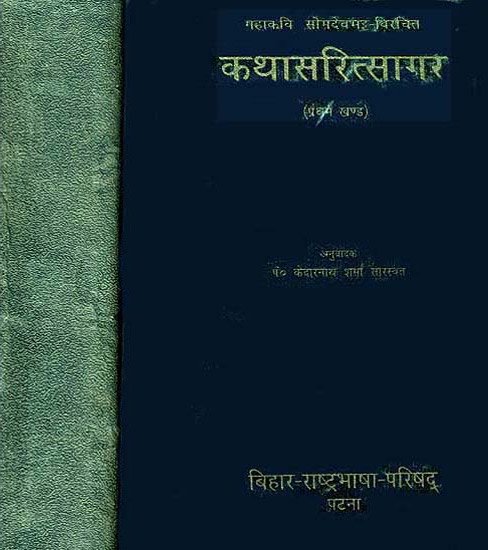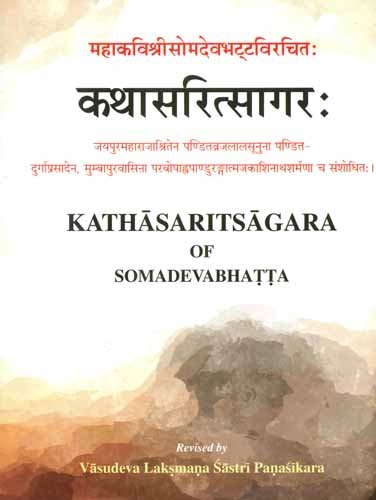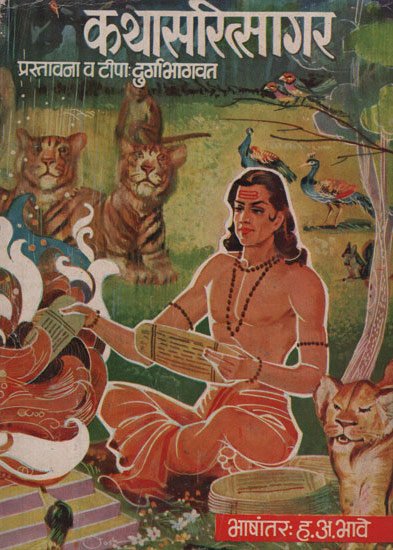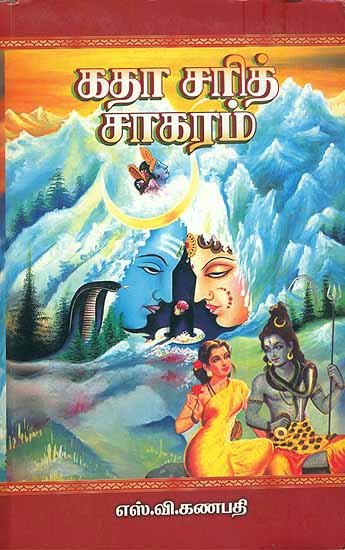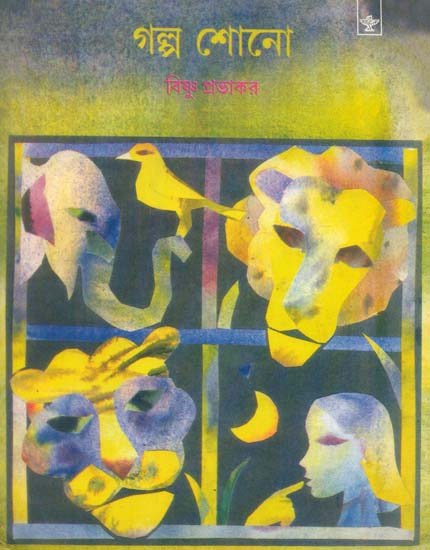Kathasaritsagara [sanskrit]
by C. H. Tawney | 2014 | 226,424 words | ISBN-13: 9789350501351
The Sanskrit edition of the Kathasaritsagara referencing the English translation and grammatical analysis. Written by Somadeva and dating from the 12th century, the Kathasaritsagara (or Katha-sarit-sagara) represents an epic legend narrating the adventures of Naravahanadatta as he strives to become the destined emperor of the Vidyadharas. Alternative titles: (Kathāsaritsāgara, कथासरित्सागर, Kathā-sarit-sāgara)
Verse 8.2.374
तद् धर्मे पथि वर्तितव्यम् अधुना बोद्धव्यम् अस्मद्वचो भोक्ष्यध्वे सततं सुखानि परमाम् आसाद्य येन श्रियम् ।
नैव स्याच् च पुरा यथा परिभवो भूयः परेभ्यो ऽत्र वो धर्मातिक्रमिणो ऽसुरा हि मुरजिच्चक्रस्य याता वशम् ॥ ३७४ ॥
tad dharme pathi vartitavyam adhunā boddhavyam asmadvaco bhokṣyadhve satataṃ sukhāni paramām āsādya yena śriyam |
naiva syāc ca purā yathā paribhavo bhūyaḥ parebhyo 'tra vo dharmātikramiṇo 'surā hi murajiccakrasya yātā vaśam || 374 ||
The English translation of Kathasaritsagara Verse 8.2.374 is contained in the book The Ocean of Story by C.H. Tawney. This book is available online or you could buy the latest edition:
Read online Buy now! The English translation by C.H. Tawney (2014)
Glossary of Sanskrit terms
Note: This extracts Sanskrit terms and links to English definitions from the glossary, based on an experimental segmentation of verse (8.2.374). Some terms could be superfluous while some might not be mentioned. Click on the word to show English definitions.
Tad, Tat, Dharma, Pathin, Pathi, Vartitavya, Boddhavya, Asmad, Vaca, Vacas, Satatam, Satata, Sukha, Parama, Asadya, Yena, Yah, Yat, Shri, Shriya, Naiva, Syat, Sya, Pura, Yatha, Paribhava, Bhuyah, Bhuyas, Para, Atra, Yushmad, Dharman, Atikramin, Asura, Murajit, Cakra, Yata, Vasha,
Analysis of Sanskrit grammar
Note: this is an experimental feature and only shows the first possible analysis of the Sanskrit text (Kathasaritsagara Verse 8.2.374). If the system was successful in segmenting the sentence, you will see of which words it is made up of, generally consisting of Nouns, Pronouns, Verbs, Participles and Indeclinables. Click on the link to show all possible derivations of the word.
- Line 1: “tad dharme pathi vartitavyam adhunā boddhavyam asmadvaco bhokṣyadhve satataṃ sukhāni paramām āsādya yena śriyam ”
- tad -
-
tad (indeclinable)[indeclinable]tad (indeclinable adverb)[indeclinable adverb]tat (indeclinable correlative)[indeclinable correlative]tad (noun, neuter)[compound], [nominative single], [accusative single]
- dharme -
-
dharma (noun, masculine)[locative single]dharmā (noun, feminine)[nominative dual], [vocative single], [vocative dual], [accusative dual]
- pathi -
-
pathin (noun, masculine)[compound], [adverb], [locative single]pathī (noun, masculine)[adverb], [vocative single]pathī (noun, feminine)[compound], [adverb], [vocative single]pathī (noun, neuter)[compound], [adverb], [nominative single], [vocative single], [accusative single]
- vartitavyam -
-
vartitavya (noun, masculine)[adverb], [accusative single]vartitavya (noun, neuter)[adverb], [nominative single], [accusative single]vartitavyā (noun, feminine)[adverb]√vṛt -> vartitavya (participle, masculine)[accusative single from √vṛt class 1 verb]√vṛt -> vartitavya (participle, neuter)[nominative single from √vṛt class 1 verb], [accusative single from √vṛt class 1 verb]
- adhunā* -
-
√dhū (verb class 9)[imperfect active second single]
- boddhavyam -
-
boddhavya (noun, masculine)[adverb], [accusative single]boddhavya (noun, neuter)[adverb], [nominative single], [accusative single]boddhavyā (noun, feminine)[adverb]
- asmad -
-
asmad (pronoun, none)[ablative plural]
- vaco* -
-
vacas (noun, masculine)[compound], [vocative single]vacas (noun, neuter)[compound], [nominative single], [vocative single], [accusative single]vaca (noun, masculine)[nominative single]
- bhokṣyadhve -
-
√bhuj (verb class 6)[future middle second plural]√bhuj (verb class 7)[future middle second plural]
- satatam -
-
satatam (indeclinable)[indeclinable]satata (noun, masculine)[adverb], [accusative single]satata (noun, neuter)[adverb], [nominative single], [accusative single]satatā (noun, feminine)[adverb]
- sukhāni -
-
sukha (noun, neuter)[nominative plural], [vocative plural], [accusative plural]
- paramām -
-
paramā (noun, feminine)[accusative single]
- āsādya -
-
āsādya (noun, masculine)[compound], [vocative single]āsādya (noun, neuter)[compound], [vocative single]
- yena -
-
yena (indeclinable)[indeclinable]ya (noun, masculine)[instrumental single]yaḥ (pronoun, masculine)[instrumental single]yat (pronoun, neuter)[instrumental single]
- śriyam -
-
śriyā (noun, feminine)[adverb]śriya (noun, masculine)[adverb], [accusative single]śriya (noun, neuter)[adverb], [nominative single], [accusative single]śrī (noun, feminine)[accusative single]śrī (noun, masculine)[accusative single]
- Line 2: “naiva syāc ca purā yathā paribhavo bhūyaḥ parebhyo 'tra vo dharmātikramiṇo 'surā hi murajiccakrasya yātā vaśam ”
- naiva -
-
naiva (indeclinable)[indeclinable]
- syāc -
-
syāt (indeclinable adverb)[indeclinable adverb]syāt (indeclinable)[indeclinable]sya (noun, neuter)[adverb], [ablative single]√as (verb class 2)[optative active third single]
- ca -
-
ca (indeclinable conjunction)[indeclinable conjunction]ca (noun, masculine)[compound], [vocative single]ca (noun, neuter)[compound], [vocative single]
- purā* -
-
pura (noun, masculine)[nominative plural], [vocative plural]purā (noun, feminine)[nominative plural], [vocative plural], [accusative plural]
- yathā -
-
yathā (indeclinable adverb)[indeclinable adverb]yathā (indeclinable relative)[indeclinable relative]yathā (indeclinable)[indeclinable]
- paribhavo* -
-
paribhava (noun, masculine)[nominative single]
- bhūyaḥ -
-
bhūyaḥ (indeclinable)[indeclinable]bhūyas (noun, masculine)[compound], [adverb]bhūyas (noun, neuter)[compound], [adverb], [nominative single], [vocative single], [accusative single]
- parebhyo' -
-
para (noun, masculine)[dative plural], [ablative plural]para (noun, neuter)[dative plural], [ablative plural]
- atra -
-
atra (indeclinable adverb)[indeclinable adverb]atra (noun, masculine)[compound], [vocative single]atra (noun, neuter)[compound], [vocative single]
- vo* -
-
va (noun, masculine)[nominative single]yuṣmad (pronoun, none)[accusative plural], [dative plural], [genitive plural]
- dharmā -
-
dharma (noun, masculine)[compound], [vocative single]dharman (noun, neuter)[adverb], [nominative single], [vocative single], [accusative single]dharman (noun, masculine)[nominative single]dharmā (noun, feminine)[nominative single]
- atikramiṇo' -
-
atikramin (noun, masculine)[nominative plural], [vocative plural], [accusative plural], [ablative single], [genitive single]atikramin (noun, neuter)[ablative single], [genitive single]
- asurā* -
-
asura (noun, masculine)[nominative plural], [vocative plural]asurā (noun, feminine)[nominative plural], [vocative plural], [accusative plural]
- hi -
-
hi (indeclinable particle)[indeclinable particle]
- murajic -
-
murajit (noun, masculine)[compound], [adverb], [nominative single], [vocative single]
- cakrasya -
-
cakra (noun, masculine)[genitive single]cakra (noun, neuter)[genitive single]
- yātā* -
-
yāta (noun, masculine)[nominative plural], [vocative plural]yātā (noun, feminine)[nominative plural], [vocative plural], [accusative plural]√yā -> yāta (participle, masculine)[nominative plural from √yā class 2 verb], [vocative plural from √yā class 2 verb]√yā -> yātā (participle, feminine)[nominative plural from √yā class 2 verb], [vocative plural from √yā class 2 verb], [accusative plural from √yā class 2 verb]
- vaśam -
-
vaśa (noun, masculine)[adverb], [accusative single]vaśa (noun, neuter)[adverb], [nominative single], [accusative single]vaśā (noun, feminine)[adverb]
Other editions:
Also see the following editions of the Sanskrit text or (alternative) English translations of the Kathasaritsagara Verse 8.2.374
Kathasaritsagar
by Kedarnath Sharma Saraswat (2005)
The Only Edition with the Sanskrit Text and its Hindi Translation (An Old and Rare Book) Set of 3 Vol.
Buy now!
Kathasaritsagara of Somadeva Bhatta (Sanskrit Text Only)
by Vasudeva Laksmana Sastri (2013)
Katha Sarit Sagar in Marathi
by H. A Bhave (1995)
Set of 5 Volumes; Published by Varada Books, Pune. 2256 pages (Throughout B/W Illustrations).
Buy now!
Katha Sarit Sagara (Tamil)
by S. V. Ganapati (எஸ். வி. கணபதி) (2014)
[கதா சரித் சாகரம்] Published by Alliance Publications.
Buy now!
Galpa Shono
by Abhijit Chattopadhyay (2014)
[গল্প শোনো] Galpa Shono: Bengali Translation of 'Suno Kahani From Katha Sarit Sagar'; 9788126015436; Published by Sahitya Akademi, Delhi.
Buy now!Preview of verse 8.2.374 in Bengali sript:
তদ্ ধর্মে পথি বর্তিতব্যম্ অধুনা বোদ্ধব্যম্ অস্মদ্বচো ভোক্ষ্যধ্বে সততং সুখানি পরমাম্ আসাদ্য যেন শ্রিযম্ ।
নৈব স্যাচ্ চ পুরা যথা পরিভবো ভূযঃ পরেভ্যো ঽত্র বো ধর্মাতিক্রমিণো ঽসুরা হি মুরজিচ্চক্রস্য যাতা বশম্ ॥ ৩৭৪ ॥
![Kathasaritsagara [sanskrit] - book cover](/uploads/a/Katha-Sarit-Sagara.jpg)
